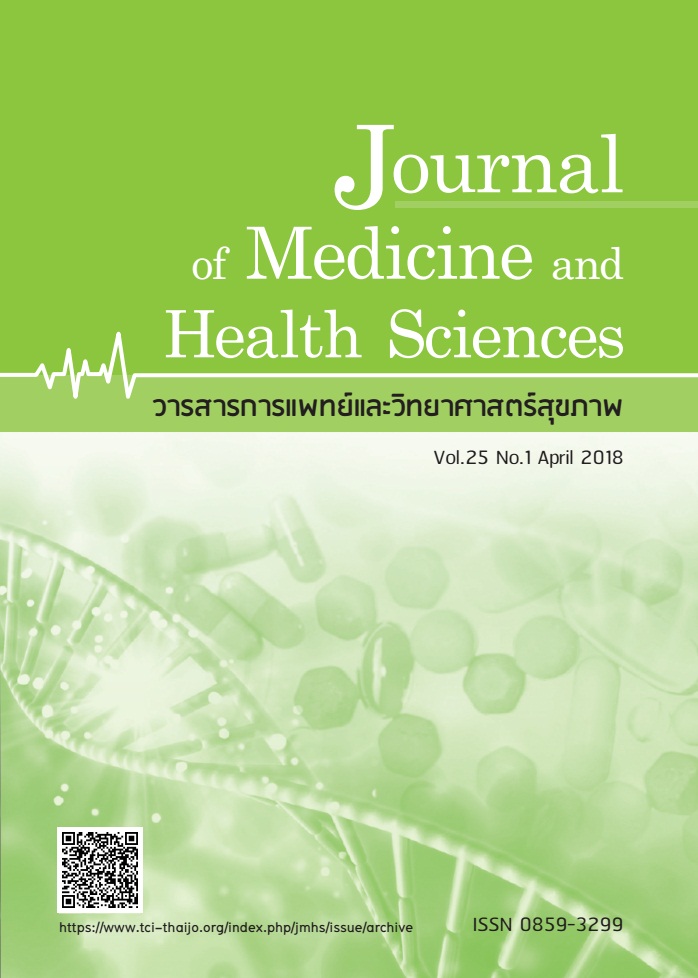ผลการปรึกษากลุ่มพฤติกรรมทางปัญญาที่มีต่อความตั้งใจ ในการเลิกสารเสพติดของผู้ติดสารเสพติด
Keywords:
ความตั้งใจในการเลิกสารเสพติด, ผู้ติดสารเสพติด, พฤติกรรมทางปัญญาAbstract
บทคัดย่อ
การวิจัยในครั้งนี้มีวัตถุประสงค์เพื่อศึกษาผลการปรึกษากลุ่มพฤติกรรมทางปัญญาที่มีต่อความตั้งใจใน การเลิกสารเสพติดของผู้ติดสารเสพติด กลุ่มตัวอย่าง ได้แก่ ผู้ติดสารเสพติดที่เข้ารับการบำบัดรักษาแบบผู้ป่วยนอก คลินิกแสงตะวัน โรงพยาบาลองครักษ์ อายุ 18-35 ปี ที่มีผลคะแนนจากแบบวัดความตั้งใจในการเลิกสาร เสพติดในระดับต่ำกว่าเปอร์เซ็นต์ไทล์ที่ 25 จำนวน 20 คน จำแนกออกเป็น 2 กลุ่ม คือ กลุ่มทดลองและกลุ่ม ควบคุม กลุ่มละ 10 คน เครื่องมือที่ใช้ในการวิจัยประกอบด้วย แบบวัดความตั้งใจในการเลิกสารเสพติดที่มีค่า ความเที่ยงเท่ากับ 0.88 และโปรแกรมการปรึกษากลุ่มพฤติกรรมทางปัญญาที่ผู้วิจัยสร้างขึ้น จำนวน 12 ครั้ง แบ่งเป็นสัปดาห์ละ 2 ครั้ง ครั้งละ 90 นาที เก็บข้อมูลตั้งแต่เดือนตุลาคม - ธันวาคม 2559 โดยใช้แบบแผน การวิจัยเชิงทดลอง เก็บข้อมูลแบ่งเป็น 3 ระยะ คือ ระยะก่อนการทดลอง ระยะหลังการทดลอง และระยะ ติดตามผล วิเคราะห์ข้อมูลโดยการวิเคราะห์ความแปรปรวนแบบวัดซ้ำประเภทหนึ่งตัวแปรระหว่างกลุ่มและ หนึ่งตัวแปรภายในกลุ่ม ผลการวิจัยพบว่า ผู้ติดสารเสพติดในกลุ่มทดลองมีคะแนนความตั้งใจในการเลิกสารเสพติด สูงกว่ากลุ่มควบคุมในระยะหลังการทดลองอย่างมีนัยสำคัญทางสถิติที่ระดับ 0.05 และผู้ติดสารเสพติดกลุ่ม ทดลองมีคะแนนความตั้งใจในการเลิกสารเสพติดในระยะหลังการทดลองและระยะติดตามผลสูงกว่าระยะก่อน การทดลองอย่างมีนัยสำคัญทางสถิติที่ระดับ 0.05
Abstract
This experimental research aimed to study the effects of cognitive behavioral group counseling on abstinent intention in drugs addict patients. The samples used in this were 20 drug addict patients whose age were between 18-35 years old, those who had abstinent intention’s scores less than 25th percentile and volunteered to participate in the study. They were randomly assigned to the experiment and control group, 10 persons in each group. The instruments used in this research were the measurement of abstinent intention test which the reliability of 0.88 and the interventional program cognitive behavioral group counseling. The experimental group received 12 sessions of counseling, 2 sessions per week, each session lasted about 90 minutes. From October to December, 2016. The study was divided into 3 phases: pre-experiment, post-experiment and follow-up. The data were analyzed by using repeated measures analysis of variance: one between-subjects variable and one within-subjects variable. The results of the study revealed that the drug addict patients in experimental group had the abstinent intention test scores higher than the control group with statistical significant difference level at 0.05 when measured in the post-experiment and follow-up phases. The drug addict patients in an experimental group had the abstinent intention test scores in post-experiment and follow-up phases higher than the pre-experiment phases with statistical significant difference level at 0.05.
References
effectiveness of cognitive-behavioral
therapy program on early relapse
prevention among Methamphetaminedependent patients. J Nurs Divis 2014;
40:1-38.
2. Departments of Mental health and
drug therapy. Report operating results
2014 - 2016. Ongkharak Hospital; 2016
(Mimeographed).
3. Ajzen & Fishbein. Understanding
attitudes and predicting social behavior.
New Jersy: Prentice Hall Inc.; 1980.
4. Chailert K. Intention of and perceived
barriers to narcotic quitting of the
rehabitated drug addicts at Operation
Dawn, Thailand [Master degree thesis].
Chiang Mai: Chiang Mai University; 1998.
5. C h a r u w a n S . D e t e r m i n a n t s o f
intentions to Heroin abstinence among
intravenous Heroin users at Northern
Drug Dependence Treatment Center
Chiangmai Province [Master degree
thesis]. Chiang Mai: Chiang Mai University;
1997.
6. Saengduenchai S. The effect of cognitivebehavioral therapy program, with
social support, on readiness for early
relapse prevention and non-relapse of
alcohol use disorder patients [Doctoral
dissertation]. Bangkok: Srinakharinwirot
University; 2010.
7. Juntachum W. A causal model of factors
associated with smoking-prevention
behaviors among lower secondary
school male students in Khonkaen
Province [Doctoral dissertation]. Bangkok:
Srinakharinwirot University; 2004.



